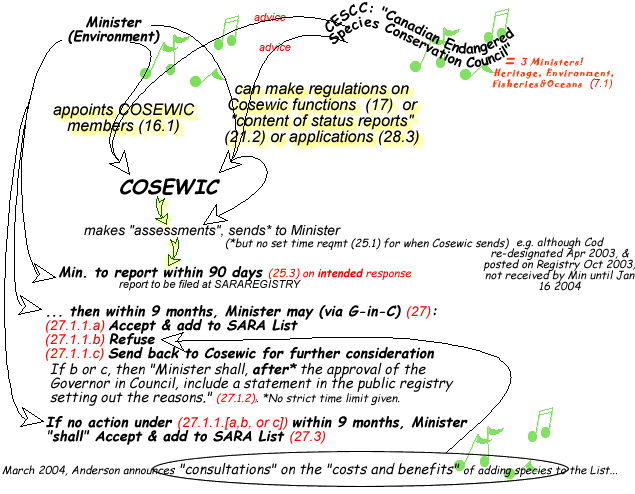
SARA:
the Species
at Risk Act, how it doesn't work
cod main page see
also Illegitimate
Consultations
see also tricks with the timelines
KNIB home page [siteSEARCH] || COD: main page 1998_Report correspondence press timeline
 |
SARA: |
(compare the U.S. Endangered Species Act)
Officially stated philosophy: “the Government, through the Governor in Council, will decide which species are added to the List in SARA, as such action could result in serious economic or social implications” (from "A
Guide to SARA", at <sararegistry.gc.ca/the_act/html/Guide_e.cfm#10>,
as on April 06 2004) |
Of course it is complete nonsense. It is not the Listing itself that "could result in ... implications". Those "implications" result from the policy that will be followed in respect of a Listing. But that policy is determined by said "Government", itself.
(Everybody knows that if a species is endangered, (a) it shouldn't have got that way, so some heads should roll somewhere, and (b) it is fossil thinking to imagine that species can be written off without an incalculable risk of future loss, cost, etc. The stated and clear purpose of conservation laws (like SARA pretends to be) acknowledges that. Everybody knows it's cheaper in the short term to shoot and roast the last [panda, chimp, rhino, whooping crane, ivorybilled woodpecker] than to conserve them (which is cheaper in the long term), so OF COURSE there will be'economic or social implications', but that's what you signed up for when you decided not to shoot and roast the last [panda ...].) Extinction and devil-may-care is cheaper in the short term; conservation pays in the long term. These debates always boil down to a short-term/long-term conflict, and the short-termers (whooping-crane roasters) are crafty at scaring people with the billing department: appealing to people who think they will pay all the costs and get none of the benefit.
So, the Government's statement could
be paraphrased as
follows:
'we have
made consequences of a Listing severe and unworkable, in order to create
an excuse to not List.'
But refusal to admit a fact (refusal to List) has
no effect on the real consequences of the fact.
Refusing to admit it's
raining doesn't mean you won't get wet. Refusing to admit you're broke doesn't
mean your cheque won't bounce. If there are no fish, refusing to
admit
it will not fill the nets.
The statement is
merely an
excuse
for
doing something
illogical: an excuse for
refusing
to admit a fact.
far•ci•cal adj. of, or having the nature of, a farce; adbsurd; ridiculous; ludicrous. --SYN. see funny. (Webster's New World Dictionary, College Edition, 1960. World Publishing Company.) 'Argument to the consequences' is the type of error being committed. It is okay to say "decide to build with a strong foundation so the building doesn't fall down", because we are talking of a voluntary action or choice there. But it is not okay, it is 'argument to the consequences' to say "those mathematicians don't know how inconvenient their value for pi is, all those decimal places, infinite in fact; it makes calculation very difficult, so why don't we just say pi=3.0? It is (equally) not okay, it is 'argument to the consequences' to say "those biologists say some populations of Cod are endangered, but that's very inconvenient for the Minister, and the Minister has the right under SARA to accept or not accept that, so let's find some 'serious economic or social implications' as an excuse to not accept that, to say Cod are not endangered." The 1-2-3: 1. See below for how it was set up in law (and un-law); 2. they suckered Cosewic to play ball and deliver an assessment/designation in a way that would generate more difficulties (to harvest as objections); 3. then see here for how it was finally assembled into a political coup. The key ingredient for all that to work is secrecy; next is unaccountability. I have said elsewhere that DFO suckered Cosewic into step 2; 'suckered' because Cosewic got left holding the bag as DFO let them appear incompetent for lumping together all the populations (1998, contrary to Report recommendation of 10 units), then (2003 Update) all populations from the S. Grand Banks to Northern Labrador. But in my opinion, some senior bureaucrats also suckered Cabinet & Ministers DoE DFO etc. into deflecting an at-risk designation that would have more clearly spotlighted past mismanagement and the tradition of stonewalling. |
The stated philosophy (leaving aside for a moment question of whether it has true legitimacy) could have been accomplished forthrightly with an independent Cosewic, if politicians had been willing to properly be accountable for their variance from its recommendations. I.e., if politicians had been willing to honestly declare their roles and reasoning.
But SARA goes much farther than that. SARA explicitly empowers politicians to control (not just influence) who sits on Cosewic, how it carries out its functions, and what “content” status reports can have. Politicians even have the opportunity to set remunerations within Cosewic. By those means, SARA gives politicians the way to manipulate Cosewic so as to minimise the apparent variance between Cosewic recommendation and political Action. BUT, in fact, this is nothing new – it is what politicians have been doing for some time. SARA merely makes it official.

(note also the tricks with the 9-month timeline)
The difficulties with SARA are:
Compare the U.S. Endangered Species Act:
|